With all of these moves towards digital delivery in entertainment, we thought it would be worthwhile understanding one of the key items in this process – how to get the digital content to UK households.
Steve Kennedy is an acknowledged expert in the telecoms and data networks field, so it was an obvious choice for us to ask him to write an overview of how other IP operators can compete with BT – by creating their own data network. To do this, they need to put their own equipment into the telephone exchanges that connect to peoples houses. That process is Local Loop Unbundling (LLU).
Over three parts, we’ll give you a full background in LLU in the UK.
The two previous pieces gave an overview of LLU and which companies are players in the UK; and LLU Penetration in the UK and the (un)Economics of it.
OpenLLU
The operators should have joined forces and built a single LLU infrastructure between them and then competed on service. This would have meant a second national network to compete with BT’s 21CN allowing operators to compete with BT on their own terms.
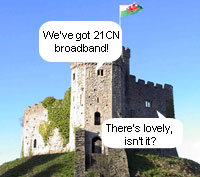 Also a single network would have meant it could go to many more of the 5,600 DLEs than the 1,200 everyone’s competing for at the moment.
Also a single network would have meant it could go to many more of the 5,600 DLEs than the 1,200 everyone’s competing for at the moment.
Unfortunately competition is so fierce between the telecoms operators it will never happen – much to their joint detriment.
Broadband Competition
BT is still the biggest player by far and they’ll try and increase market share when they launch their 21CN. Many operators are underestimating the effect of BT’s 21CN and how quickly BT can launch it.
When they do launch, they are trying to get back to a situation whereby everyone else once again becomes a BT reseller.
Virgin Media have around 4m customers, but they have little money for expansion and are likely to use LLU in future to provide broadband services. They’re stance is even worse now Sky have pulled their basic channels, which is likely to cause customers to migrate to Sky and if enough go, then Virgin Media may be in a sticky situation (the city won’t look kindly on a reduced customer base).
Wireless is the next big hope
Unfortunately there’s very little spectrum available for wireless broadband in the UK, though 2.5GHz is going to be made available for auction later this year, but it wont be cheap. It was reserved for 3G use, so there may be bids from 3G operators but it’s also bang in the middle of the frequencies WiMAX can use (BT have already said they’re interested in bidding for it).
Other companies who do have spectrum are: –
* PCCW (UK Broadband) who have a national 3.4GHz license.
* Pipex Wireless who have a national 3.6/4.2 GHz license.
It’s not clear whether the recent Pipex sale announcement covers the wireless side or not.
Future
Content will be key, access will just be a delivery channel for content and broadband will just be a commodity item (making it even more uneconomic to roll-out).
There’s going to be even more consolidation in the industry and BT will win either way (more LLU customers mean BT get more customers, if it fails, BT Wholesale get more customers).
BT will also dominate when they roll-out their 21CN, they want to be the Sky of fixed networks i.e. use them to deliver the content and they take a big chunk for the customer charge for doing so).
The future’s bright – but only for BT.
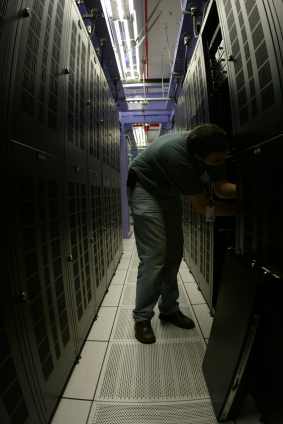 Since the operators all want to get into the same exchanges, there’s overcrowding and BT have to install new hostel space (the space where operators can put their own equipment into) which causes delays. It can take more than 6 months from when an operator puts an order in to being granted access to an exchange.
Since the operators all want to get into the same exchanges, there’s overcrowding and BT have to install new hostel space (the space where operators can put their own equipment into) which causes delays. It can take more than 6 months from when an operator puts an order in to being granted access to an exchange.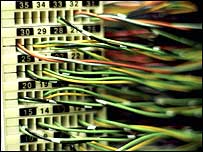 Unfortunately the economics of LLU only work if there’s a lot of customers per exchange i.e. massive scale.
Unfortunately the economics of LLU only work if there’s a lot of customers per exchange i.e. massive scale.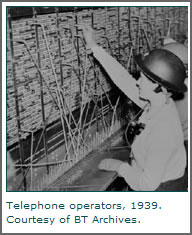 What is Local Loop Unbundling (LLU)?
What is Local Loop Unbundling (LLU)?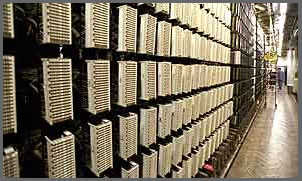 Any operator wanting to offer broadband (and possibly voice) has to put their equipment in these DLEs. However there is a cost to unbundling an exchange (around 100,000 including backhaul) which means operators are only targeting the most densely populated ones.
Any operator wanting to offer broadband (and possibly voice) has to put their equipment in these DLEs. However there is a cost to unbundling an exchange (around 100,000 including backhaul) which means operators are only targeting the most densely populated ones.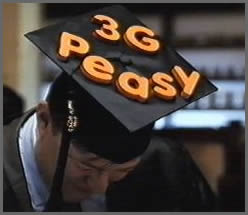 Currently Vodafone have a bigger network than Orange, so Orange would gain more than Vodafone from the deal, but in future it means that new cell sites will be used by both operators.
Currently Vodafone have a bigger network than Orange, so Orange would gain more than Vodafone from the deal, but in future it means that new cell sites will be used by both operators. Why the rush to build?
Why the rush to build?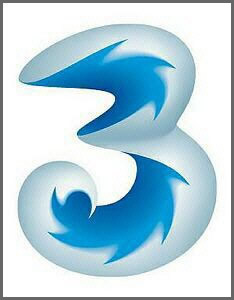 Though city centres might have a demand for 3G (for data services, no one cares about 3G voice – a voice call sounds the same whether it’s 3G or GSM), as you leave dense urban areas the appeal of 3G is less. Well maybe not less, but there are less people to use it and less of a reason for the networks to install 3G infrastructure and sites.
Though city centres might have a demand for 3G (for data services, no one cares about 3G voice – a voice call sounds the same whether it’s 3G or GSM), as you leave dense urban areas the appeal of 3G is less. Well maybe not less, but there are less people to use it and less of a reason for the networks to install 3G infrastructure and sites. Yesterday saw the press unveiling of Sky Broadband, showing the eventual absorption of EasyNet, the UK ISP that they
Yesterday saw the press unveiling of Sky Broadband, showing the eventual absorption of EasyNet, the UK ISP that they  Sky marketing have been taking their now-expected simplistic approach to the name of the product, with Base, Mid and Max. It’s genius like this that produced the name Sky+, the name that sold 100k+ PVRs to the UK public, when previously they didn’t understand what the hell it was.
Sky marketing have been taking their now-expected simplistic approach to the name of the product, with Base, Mid and Max. It’s genius like this that produced the name Sky+, the name that sold 100k+ PVRs to the UK public, when previously they didn’t understand what the hell it was. Since James Murdoch took over running Sky, its stated ambition has been 10 million subscribers by 2010, but as we get closer to that, it’s getting hard to convert over those naughty-non-subscribers.
Since James Murdoch took over running Sky, its stated ambition has been 10 million subscribers by 2010, but as we get closer to that, it’s getting hard to convert over those naughty-non-subscribers. As expected, Sky has released details of their new “free” broadband promotion, which offers their 2Mb Base package for nowt.
As expected, Sky has released details of their new “free” broadband promotion, which offers their 2Mb Base package for nowt. For users out of a Sky network area, there’s the pricey ‘Connect’ option which offers up to 8Mbs connectivity, 40GB usage cap, £40 activation fee and £50 home install for a distinctly upmarket £17 per month.
For users out of a Sky network area, there’s the pricey ‘Connect’ option which offers up to 8Mbs connectivity, 40GB usage cap, £40 activation fee and £50 home install for a distinctly upmarket £17 per month. 30 per cent of Sky customers on broadband
30 per cent of Sky customers on broadband BT’s dominance of the UK home telephone is coming under fresh pressure as the phone call market becomes the most liberal in Europe. Previously, their pricing levels have had to be agreed in advance with the UK regulator Ofcom, but with it understood that this is going to be lifted soon, price cuts are expected.
BT’s dominance of the UK home telephone is coming under fresh pressure as the phone call market becomes the most liberal in Europe. Previously, their pricing levels have had to be agreed in advance with the UK regulator Ofcom, but with it understood that this is going to be lifted soon, price cuts are expected. Technical-savvy Skype callers have for a long time taken advantage of VoIP calling to obtain free or cheap calls.
Technical-savvy Skype callers have for a long time taken advantage of VoIP calling to obtain free or cheap calls. This morning, Homechoice, the currently London-focused DSL-based VOD announced that they had appointed CSFB (Credit Suisse First Boston, as was) to raise new capital for their expansion around the UK.
This morning, Homechoice, the currently London-focused DSL-based VOD announced that they had appointed CSFB (Credit Suisse First Boston, as was) to raise new capital for their expansion around the UK. Their newly-announced ARPU (Average Revenue Per User) figures are impressive at £430, being considerably higher than Sky’s £384 (announced in 3 August 2005), but lower than Telewest’s £538 and ntl’s £477 (reported to ofcom, Q2 2005).
Their newly-announced ARPU (Average Revenue Per User) figures are impressive at £430, being considerably higher than Sky’s £384 (announced in 3 August 2005), but lower than Telewest’s £538 and ntl’s £477 (reported to ofcom, Q2 2005). BSkyB’s Director of Product Management, Gerry O’Sullivan couldn’t help sounding smug as he took centre stage at The Connected Home conference in London today.
BSkyB’s Director of Product Management, Gerry O’Sullivan couldn’t help sounding smug as he took centre stage at The Connected Home conference in London today. While Microsoft’s Cynthia Crossley and Telewest’s Mark Horley nodded collaboratively to Merlin Kister of Intel’s assertion that “We mustn’t be close minded and pick a winner. It’s important for all players to work together,” O’Sullivan looked disinterested.
While Microsoft’s Cynthia Crossley and Telewest’s Mark Horley nodded collaboratively to Merlin Kister of Intel’s assertion that “We mustn’t be close minded and pick a winner. It’s important for all players to work together,” O’Sullivan looked disinterested. “There’s zero tolerance (among our customers) for that sort of unreliability and pain…we can only roll out products that you switch on and they work.”
“There’s zero tolerance (among our customers) for that sort of unreliability and pain…we can only roll out products that you switch on and they work.” Horley mentioned that Telewest was launching its own 160GB PVR in early 2006, with the WHOLE disc available for recording “as we already offer video on demand”.
Horley mentioned that Telewest was launching its own 160GB PVR in early 2006, with the WHOLE disc available for recording “as we already offer video on demand”.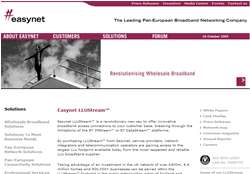 As we reported last week, Easynet has been bought by Sky – as long as they get shareholder approval, but since Sky have offered a premium on Easynet’s shares, this should be a done deal.
As we reported last week, Easynet has been bought by Sky – as long as they get shareholder approval, but since Sky have offered a premium on Easynet’s shares, this should be a done deal. Even though Sky are buying into LLU, Easynet only cover around 250 exchanges and currently all the voice goes to BT (Easynet use the shared metallic path LLU option), while Sky are likely to want to take the phone service as well (they already have a SkyTalk package using CPS provided by THUS). Sky will need to invest to make this a reality as well as increasing Easynet’s coverage. They have said they want to go into around 1000 exchanges, so that’s a build out of around 750 – which won’t be cheap (probably another £100m’ish at least).
Even though Sky are buying into LLU, Easynet only cover around 250 exchanges and currently all the voice goes to BT (Easynet use the shared metallic path LLU option), while Sky are likely to want to take the phone service as well (they already have a SkyTalk package using CPS provided by THUS). Sky will need to invest to make this a reality as well as increasing Easynet’s coverage. They have said they want to go into around 1000 exchanges, so that’s a build out of around 750 – which won’t be cheap (probably another £100m’ish at least). If all the LLU players aggregated infrastructure and competed on services, they could build a 21CN of their own now. LLU competition is going to be fiercely competitive with Wanadoo, AOL, Sky and even Be offering a triple-play – all competing for the same customers. – as well as BT (who will have nationwide coverage) and not ignoring NTL/Telewest who are also going into LLU.
If all the LLU players aggregated infrastructure and competed on services, they could build a 21CN of their own now. LLU competition is going to be fiercely competitive with Wanadoo, AOL, Sky and even Be offering a triple-play – all competing for the same customers. – as well as BT (who will have nationwide coverage) and not ignoring NTL/Telewest who are also going into LLU.